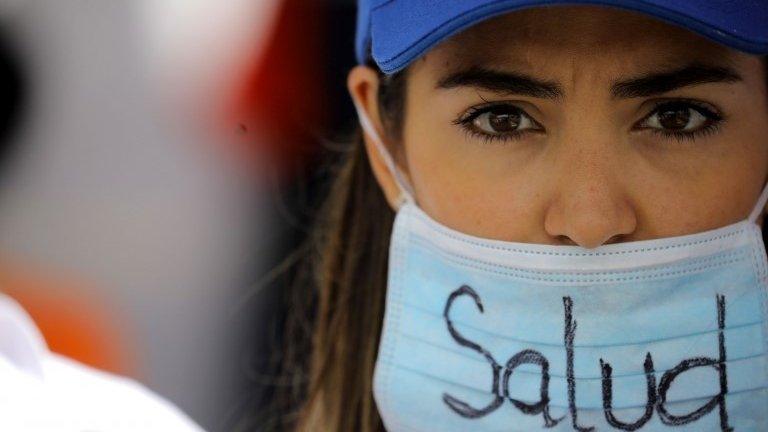Venezuela crisis: Maduro cuts ties with US after it recognises opposition leader
- Published
Thousands attended Wednesday's rally in Caracas against President Maduro
Venezuelan President Nicolás Maduro has broken off relations with the US after it recognised opposition leader Juan Guaidó as interim leader.
Mr Maduro gave US diplomats 72 hours to leave the country but the US said the "former president" no longer had the authority to order them out.
On Wednesday, Mr Guaidó had declared himself president during mass protests.
The US has urged the military to back Mr Guaidó, but so far it has remained loyal to Mr Maduro.
Mr Maduro took office in 2013 after the death of Hugo Chávez. He was sworn in for a second term this month after elections last May that were marred by an opposition boycott and widespread claims of vote-rigging.
Venezuela has been in economic freefall. Hyperinflation, power cuts and shortages of basic items have driven millions of people from the country.
What happened at the Caracas protest?
Thousands of Venezuelans attended a rally on Wednesday in support of Mr Guaidó, who is the head of the opposition-controlled National Assembly.
He told the cheering crowd that protests would continue "until Venezuela is liberated".
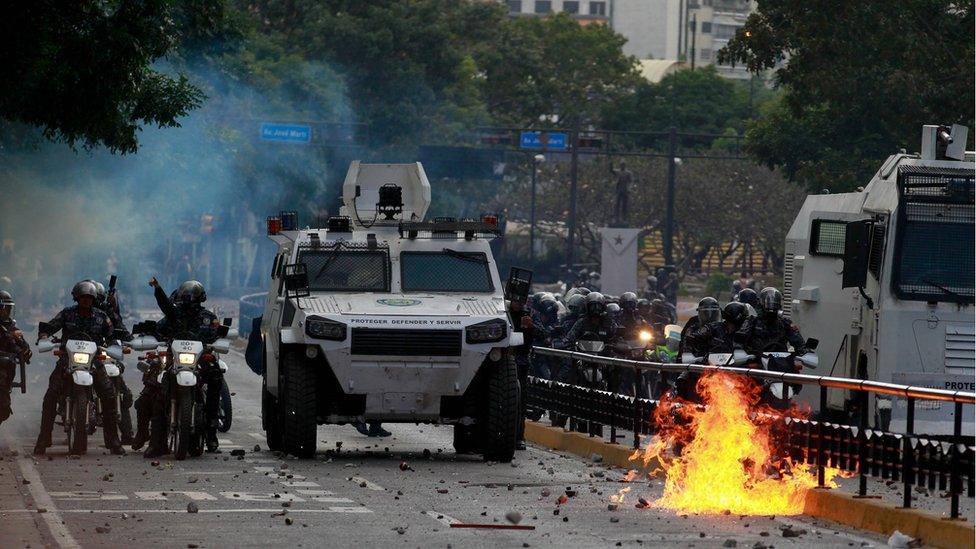
NGOs said 14 people had been shot dead during protests
Mr Guaidó then raised his right hand and said: "I swear to formally assume the national executive powers as acting president," vowing to lead a transitional government and hold free elections.
Mr Guaidó is citing articles 233 and 333 of the constitution, external which allow the head of the National Assembly to become interim president in the absence of the president. Mr Guaidó argues that Mr Maduro is not president because last May's elections are invalid.
Mr Guaidó has called on the armed forces to disobey the government.
Venezuelan NGOs said that 14 people were shot dead during protests on Tuesday and Wednesday.
How did the US respond?
President Donald Trump recognised Mr Guaidó as interim president in an apparently co-ordinated move minutes after the 35-year-old declared himself acting leader.
In a statement, he described Mr Maduro's leadership as "illegitimate", external, adding: "The people of Venezuela have courageously spoken out against Maduro and his regime and demanded freedom and the rule of law."
It warned Mr Maduro tougher sanctions could be imposed.
Mr Trump told journalists he was not considering military action but added that "all options are on the table".
He called on other nations to follow suit in supporting Mr Guaidó.
How did nations react to the call?
Seven South American nations, Brazil, Colombia, Chile, Peru, Ecuador, Argentina and Paraguay have recognised Mr Guaidó as the legitimate president.
Canada is also supporting him, while the EU called for new elections.
The Organization of American States (OAS) also recognised Mr Guaidó as president. Venezuela withdrew from organisation in 2017, accusing it of meddling in its internal affairs.
What drives someone to cross South America on foot?
Mexico, Bolivia and Cuba have expressed support for Mr Maduro.
Russia criticised those in the international community who "seek a change in power" and said any US military intervention would be "catastrophic".
Turkish President Recep Tayyip Erdogan tweeted: "My brother Maduro! Stand tall, we are standing by you."
A spokesman for the UN secretary general said António Guterres was calling for peaceful political dialogue to address the crisis.
What was President Maduro's response?
He accused Washington of trying to govern Venezuela from afar and said the opposition was seeking to stage a coup.
"We've had enough interventionism, here we have dignity, damn it!" he said in a televised address from the presidential palace, the Miraflores, where his supporters had gathered to back him.
Defence Minister Vladimir Padrino condemned Mr Guaidó's call for the army to switch sides.
"The nation's soldiers don't accept a president imposed by obscure interests, nor one self-proclaimed outside of the law," he tweeted.
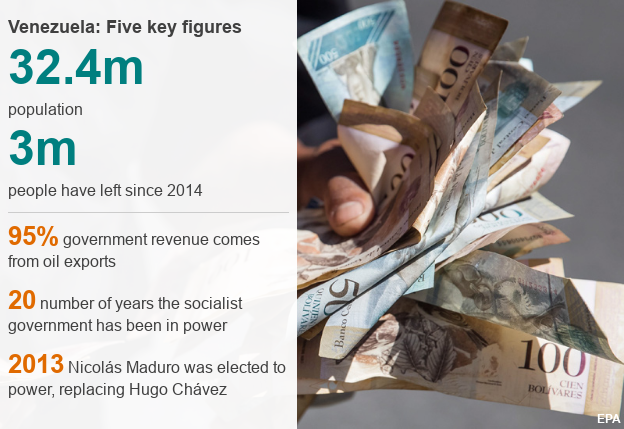

Mr Maduro and his core supporters believe Venezuela's problems are caused by US sanctions that have hampered the government by making it hard to restructure its debt.
The annual inflation rate reached 1,300,000% in the 12 months to November 2018, according to a study by the National Assembly.
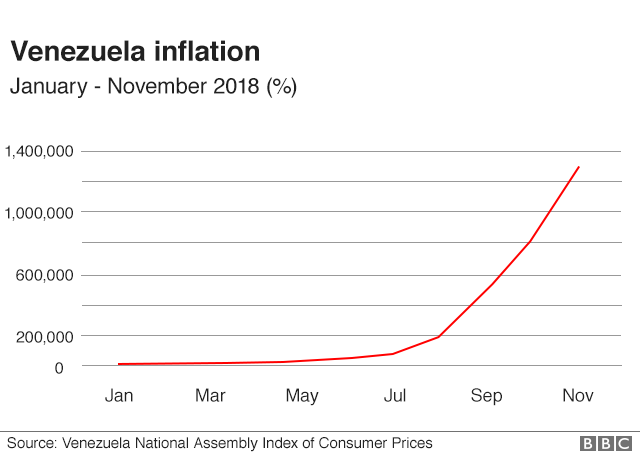

What happens next?
By Jonathan Marcus, BBC diplomatic correspondent
Does the Trump administration have a coherent plan for raising the pressure on the Maduro regime - such as freezing assets? Crisis could simply lead to a greater calamity for the Venezuelan people.
Much will depend on which way the Venezuelan military jumps.
For now, its generals may be backing the current regime. But will the lower ranks remain loyal to Mr Maduro or will they heed the growing unrest inside the country and the chorus of powerful voices coming from abroad?

Who is Juan Guaidó?

Mr Guaidó was relatively unknown until he became president of the National Assembly this month.
The opposition took power there after elections in 2015, but in 2017 Mr Maduro set up a separate body, the constituent assembly, which is filled with his supporters.
Both chambers are meeting and passing laws but the constituent assembly is the only one whose laws are being enacted by the government.
Leopoldo Lopez, Venezuela's most popular opposition leader, is seen as the architect behind Mr Guaidó's rise. Mr Lopez is under house arrest and considered by his supporters to be a political prisoner.
As a student, Mr Guaidó led protests against Hugo Chávez, who handpicked Mr Maduro as his successor.

- Published23 January 2019
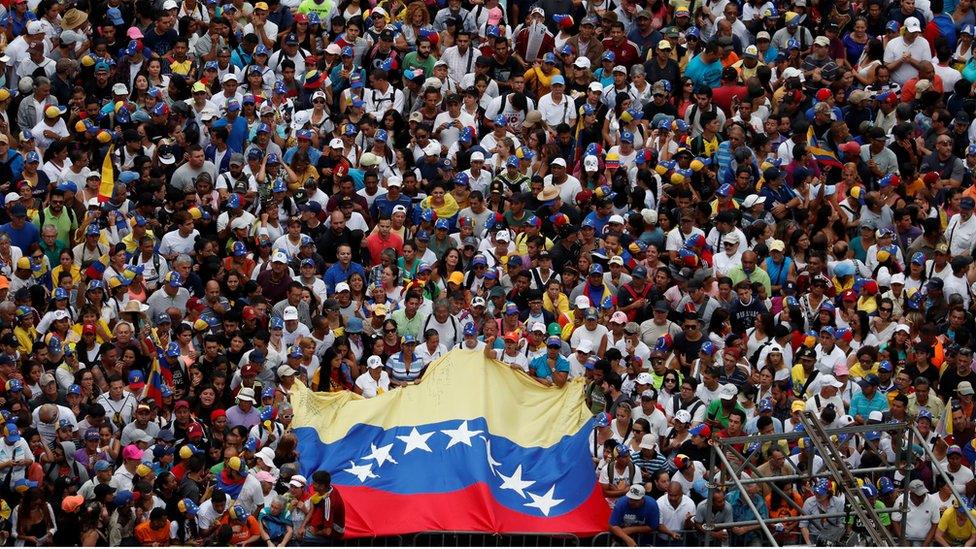
- Published12 August 2021
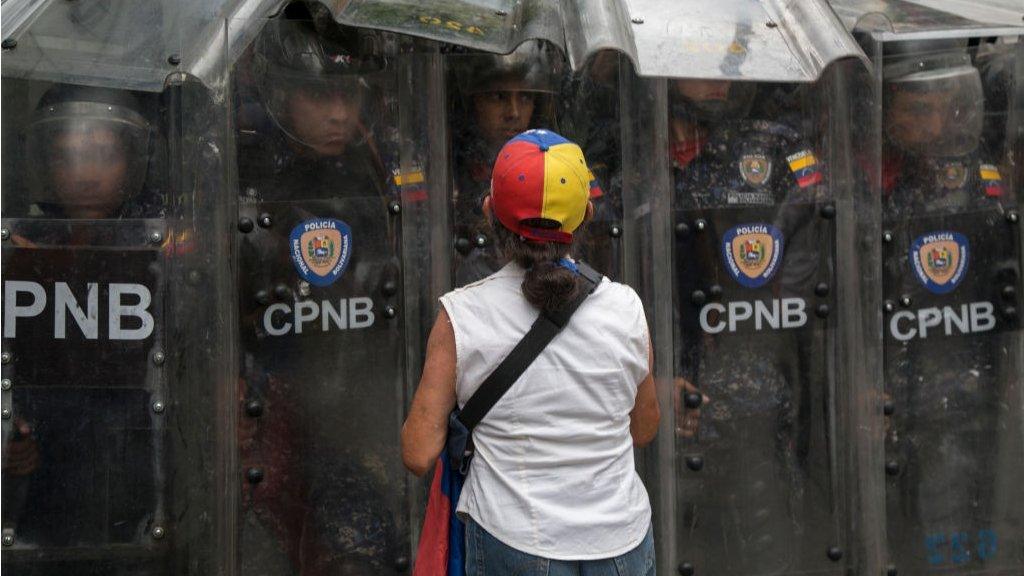
- Published30 December 2018
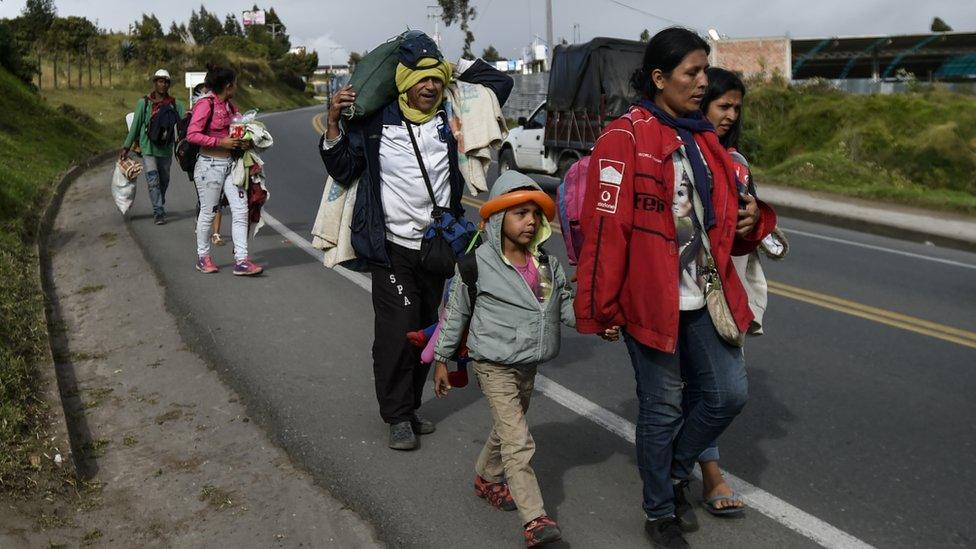
- Published10 August 2017
